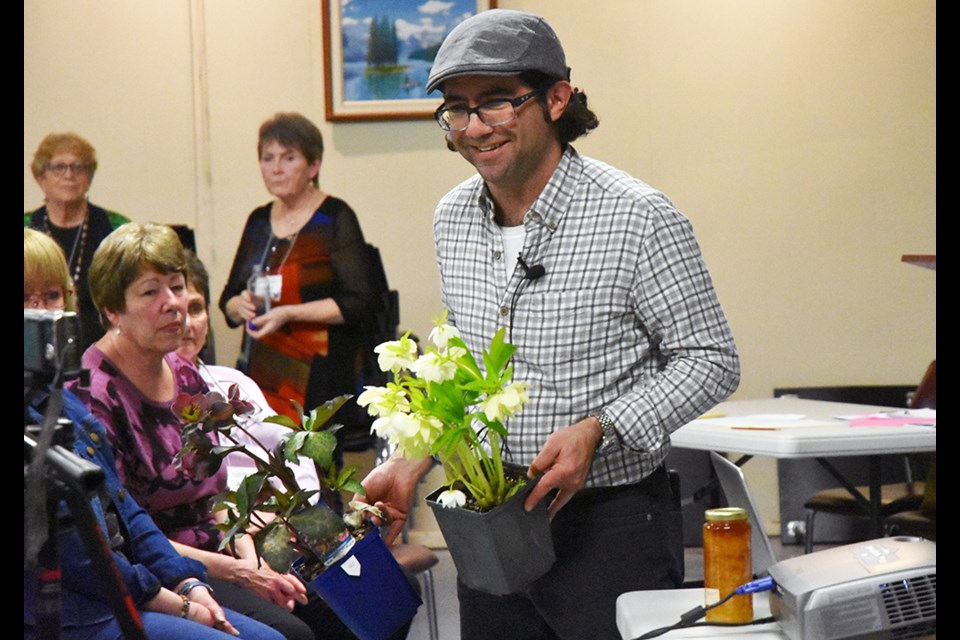For more than decades, the Bond Head-Bradford Garden Club (formerly the Bond Head & District Horticultural Society) has been bringing avid gardeners together, to share information and the joys of gardening.
On April 25, the club celebrated its 44th anniversary with birthday carrot cake, flower-decorated cupcakes, and a talk by speaker Paul Zammit, the high-energy director of horticulture at Toronto Botanical Gardens.
His topic: Inviting guests into your garden – planting for pollinators.
“Something I’m passionate about,” Zammit told the group, as he provided a primer of the sex life of plants and the importance of pollinators to the reproduction of “88 per cent of plants globally.”
“It’s an amazing relationship,” he said.
Flowers have evolved to “lure them in, give them a little bit of nectar, get them messy – covered in pollen.” Then the pollinators – not just honey bees, but solitary bees, bumblebees, flies, moths, butterflies, even beetles and hummingbirds – go on to the next flower, transferring the male pollen to the female pistil, making it possible to set fruit and seeds.
“I think we really need to rethink our gardens, really rethink beauty,” Zammit said.
Gardeners used to go for “perfection,” dead-heading flowering plants, cutting back last year’s hollow stems, using pesticides to “annihilate,” and opting for hybrid, showy double- and multiple-bloomed varieties.
But those past-their-prime flower heads provide food for birds, hollow plant stems provide nesting sites for solitary mason and leaf-cutter bees, pesticides don’t discriminate between “good” and “bad” insects, and those multiple blooms may not produce any nectar.
"Nectaries get converted to petals,” Zammit said. The question gardeners should ask is "not is it beautiful, but is it alive?”
Let the garden get a little messy, Zammit urged. Leave the seed heads on the plants. Don’t go “mulch-mad” but leave some bare ground for ground-nesting pollinators. Let clover pop up in the lawn, or throw some crocus bulbs in with the grass seed; the crocuses will finish flowering by the time the grass is ready to mow.
Even leave a few dandelions, for the bees.
And plant a “salad bar” for pollinators that will flower all season long.
“What do pollinators need? They need the same things you do. They need water, food and shelter,” Zammit said.
Gardens provide important habitat for pollinators, overcoming the fragmentation of natural habitat created by development. They can also add greater genetic diversity for the plants themselves, and support the food chain.
Zammit brought along his own props. A flowering rose bush was used to illustrate how leaf-cutter bees – a solitary bee that can be 20 times more effective as a pollinator than a honey bee – cut pieces of a leaf to line their nests.
Two different species of hellebore demonstrated the difference between singles, and double-bloomed hybrids that actually discourage visits from pollinators.
And he handed out small sticks of honey, representing “what a worker bee will produce in her lifetime… It takes two million visits to flowers to collect enough nectar to produce 500 grams of honey.”
“Not that long ago there was negativity around bees" because they sting, Zammit said, but attitudes are changing.
“What I love about gardening (is) you never stop learning.”
He left the garden club with some final advice: “Be very aware. Be very conscious of the choices you make… Buy plants that get eaten – it’s a good thing!” And, he added, “if you plant it, they will come.”
More garden news:
The Bond Head-Bradford Garden Club holds its annual Mother’s Day Plant Sale and Bake Sale on May 11 from 9 a.m. to noon at the Bond Head Community Hall, on County Road 27. Great plants shared by members, flowering baskets and home baking. But come early for the best selection.
The Innisfil Garden Club hosts a Spring Flower Show and Social Tea on May 11, at the Churchill Community Centre in Innisfil. Members are asked to bring in flower show entries between 9:30 a.m. and 11 a.m.; and judging begins at 11 sharp. The show and tea room, offering a light lunch for $7 per person, will be open to the public from noon to 1:30 p.m.
The Innisfil Garden Club meets May 13 at 7:30 p.m., at the Churchill Community Centre in Innisfil. Guest speaker is Dan Cooper, co-author of Gardening from a Hammock, providing tips on how to make your garden work for you, not you working for your garden. Refreshments will be available.
Perennials Plus Plant Sale. Bradford United Church, 66 Barrie St. in Bradford, hosts its 16th annual sale of perennials and other plants, 8 a.m. to noon on May 18. Peonies, irises, lilies, hostas and more – bargains for your home or cottage garden.
Spring Plant Auction. The Bond Head-Bradford Garden Club holds its annual plant auction fundraiser on Thursday, May 23 at the Danube Seniors Leisure Centre, 715 Simcoe Rd. in Bradford at 7 p.m. Donated plants should be clearly labelled (name of plant, colour of bloom, etc.). Cash only please. Refreshments available.
Innisfil Garden Club’s annual Tailgate, Plant and Bake Sale and fundraising barbecue, at the South Innisfil Arboretum (Shoreacres Drive and 20 Sideroad in Innisfil) on May 25, from 8 a.m. to 1 p.m. To rent a space for the tailgate sale, contact Lucy Valente at 705-716-5848; to donate baking, call Sharon Wice at 705-456-3316; to donate plants from your garden, call Mona Rea at 705-456-3123.
Garden Clubs of Ontario present Music in Bloom 2019 Triennial Show, May 29 from 10 a.m. to 8 p.m., and May 30 from 10 a.m. to 4 p.m. at The Royal Botanical Gardens. Show is free with paid admission to the RBG, in Hamilton and Burlington. See rbg.ca for more information.
